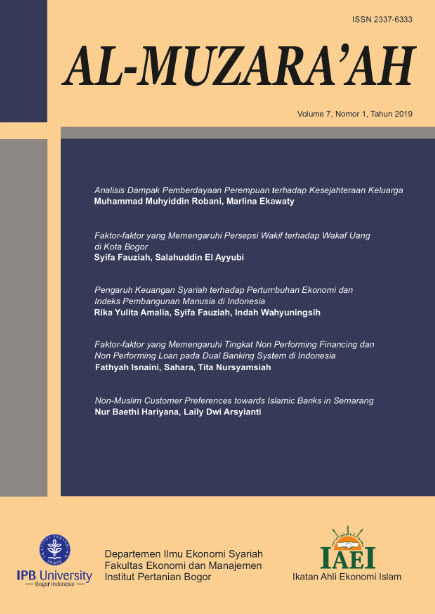Faktor-faktor yang Memengaruhi Persepsi Wakif terhadap Wakaf Uang di Kota Bogor
Main Article Content
Abstract
Waqf has a potential in developing a social and economic aspect of society. The development of waqf instrument in the attempt of social and economic growth is able to be obtained through the new concept of waqf, that is cash waqf. However, the realization of cash waqf collection was not met its potential. Based on the previous studies, one of the factors that caused the low quantity of cash waqf collection was the people that had less awareness and comprehension towards cash waqf. Even several people that already gave their waqf had only known the waqf in the form of immovable asset. This study aims to describe respondents’ characteristics and analyze the possible factors that affect wakifs’ perception towards cash waqf in Bogor City. The method used in this study was descriptive analysis and logistic regression analysis. This study was done in Bogor City and involved 50 respondents. Based on the data analysis results, wakifs’ perception was known to be affected by their comprehension towards cash waqf and their social motivation.
Downloads
Article Details

This work is licensed under a Creative Commons Attribution-ShareAlike 4.0 International License.
Author(s) who published in this journal agree to following terms:
- Authors understand and agree that copyright of manuscripts published are held by Al-Muzara'ah. The statement to release the copyright to Al-Muzara'ah is stated in form CTA (link doc).
- Copyright encompass exclusive rights to reproduce, to distribute, and to sell any part of the journal articles in all form and media.
This work is licensed under a Creative Commons Attribution-ShareAlike 4.0 International License (CC BY-SA) where Authors and Readers can copy and redistribute the material in any medium or format, as well as remix, transform, and build upon the material for any purpose, but they must give appropriate credit (cite to the article or content), provide a link to the license, and indicate if changes were made. If you remix, transform, or build upon the material, you must distribute your contributions under the same license as the original.
References
Ayyubi, S.E. & Lubis, D. (2015). Filosofi Ekonomi Syariah. Bogor (ID), IPB Press.
Beik, I.S. & Arsyianti, L.D. (2016). Ekonomi Pembangunan Syariah. Jakarta (ID), Rajawali Pers.
Fauziah, U. (2017). Survey motivasi, persepsi, sikap, religiusitas wakif Kota Tangerang Selatan [skripsi]. Jakarta, UIN Syarif Hidayatullah.
Firdaus, M., Harmini, & Afendi, F.M. (2011). Aplikasi Metode Kuantitatif untuk Manajemen dan Bisnis. Bogor, IPB Press.
Hamzah, Z. (2016). Analisis Faktor-faktor yang memengaruhi pengelolaan wakaf di Kabupaten Bogor. (Skripsi, Institut Pertanian Bogor, Indonesia).
Hasim, K., Lubis, D., & Ali, K.M. (2016). Analisis faktor-faktor yang memengaruhi penghimpunan wakaf uang di Indonesia (Pendekatan Analitical Network Process). AL-MUZARA’AH, 4(2), 127-141.
Huda, N. & Heykal, M. (2010). Lembaga Keuangan Islam: Tinjauan Teoritis dan Praktis. Jakarta (ID), Prenadamedia Group.
Huda , N., Aliyadin, A., Suprayodi, A., Arbain, D.M., Utami, R., Andriyati, R., & Harmoyo, T. (2012). Keuangan Publik Islami: Pendekatan Teoritis dan Sejarah. Jakarta (ID), KENCANA.
Huda, S. (2017). Kontribusi wakaf uang bagi pertumbuhan ekonomi umat di Yogyakarta. (Tesis, Universitas Islam Indonesia, Yogyakarta, Indonesia).
Ismail, M. & Utami, A.F. (2014). Implementasi pengelolaan wakaf tunai (Studi kasus Baitul Maal Hidayatullah dan Yayasan Dana Sosial Al-Falah). Jurnal Ilmiah Mahasiswa FEB, 3(1).
[KEMENAG] Kementerian Agama. (2015). Data Base Wakaf Kota Bogor. Bogor (ID), KEMENAG.
Mardani. (2011). Hukum Ekonomi Syariah di Indonesia. Bandung (ID), Refika Aditama.
Nisa, A.H. (2017). Faktor-faktor yang memengaruhi persepsi masyarakat terhadap wakaf uang di Kota Bogor. (Skripsi, Institut Pertanian Bogor, Indonesia).
Nizar, A. (2011). Faktor-faktor yang memengaruhi persepsi wakif tentang wakaf uang (Studi kasus pada nazhir Badan Wakaf Indonesia). (Tesis, Universitas Indonesia., Depok, Indonesia).
Rosadi, D. (2011). Analisis Ekonometrika dan Runtun Waktu Terapan dengan R, Aplikasi untuk Bidang Ekonomi, Bisnis, dan Keuangan. Yogyakarta (ID), CV Andi Offset.
Silalahi, U. (2012). Metode Penelitian Sosial. Bandung (ID), PT Rafika Aditama.
Soemitra, A. (2010). Bank dan Lembaga Keuangan Syariah. Jakarta (ID), Kencana Prenada Media Group.
Sugiyono. (2011). Statistika untuk Penelitian. Bandung (ID), Anggota Ikatan Penerbit Indonesia (IKAPI).

